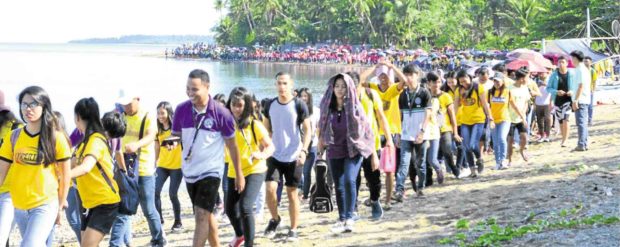
ECO WARRIORS Students and residents in Marinduque province join a coastal cleanup and a unity walk by the sea at Boac town as part of their commitment to protect the island’s environment.—CONTRIBUTED PHOTO
The lack of a “formal rehabilitation” more than two decades after a major mining tragedy hit Marinduque province has prompted the state college on the island to make environmental protection a priority program.
It has actually been doing so through various activities like planting trees on its campuses and collecting discarded food wrappers.
But more recently, the school has encouraged its students to join the island community.
They just finished a coastal cleanup project and were planning to plant Beema, a special bamboo variety capable of absorbing metal toxins and residues, throughout the province.
“What we want is to convert each and every student to become [a green] advocate,” said Merian Catajay-Mani, president of Marinduque State College (MSC), with 4,324 students on its main campus in Boac alone.
‘Love affair’
“The [school] is the most powerful venue, a breeding ground, to create a ripple effect,” she said.
It all began with “Love Affair with Mother Nature,” the school’s ecological program launched on Valentine’s Day in 2016.
Mani said the environment topped the school’s advocacies, followed by women and children empowerment, and community development.
“After 21 years, there’s been no formal rehabilitation [of the environment],” she said, referring to the 1996 Marcopper mine tailings spill with lingering damage on Boac River and residents’ health.
The Marinduque government, though, lodged a multimillion-peso suit against the mining company, but the case was eventually dismissed on technicality.
“We can’t simply be ‘antimining’ [activists] yet do nothing [about environmental protection],” Mani added.
Coastal cleanup
MSC led a cleanup drive in seven coastal villages of Boac in celebration of Earth Day last month.
The activity was held simultaneously in the towns of Torrijos, Santa Cruz and Gasan, where MSC’s satellite campuses are located.
John Mark Forcado, MSC’s advocacy officer, said the greens collected about 4,000 kilograms of trash, mostly tin cans and plastics, off Marinduque’s coastline. He said 7,043 people composed of students, teachers, MSC employees, and volunteers from the local police, local governments and civic groups joined the activity.
“After that, we had a simultaneous ‘tree-hugging’ and birdwatching,” Forcado said.
Bamboo planting
“What was most touching was to see everybody, even our janitors, our maintenance personnel, there [in the activity],” Mani said. The activity ended with a 7-kilometer “unity walk” in Boac with a short program by the sea.
Forcado said the collected trash were sorted and from which they planned to develop a community livelihood program using recyclable materials.
He also said they were gearing up for a massive bamboo tree planting in the coming months.
In 2017, a Beema bamboo nursery was opened on the MSC campus to propagate thousands of the variety.
Mani said the Beema variety could absorb up to 30 percent of carbon dioxide and could last up to 50 years without the need for replanting.
“We will plant them in the mined-out areas… We’re just waiting for the rainy season,” she said.